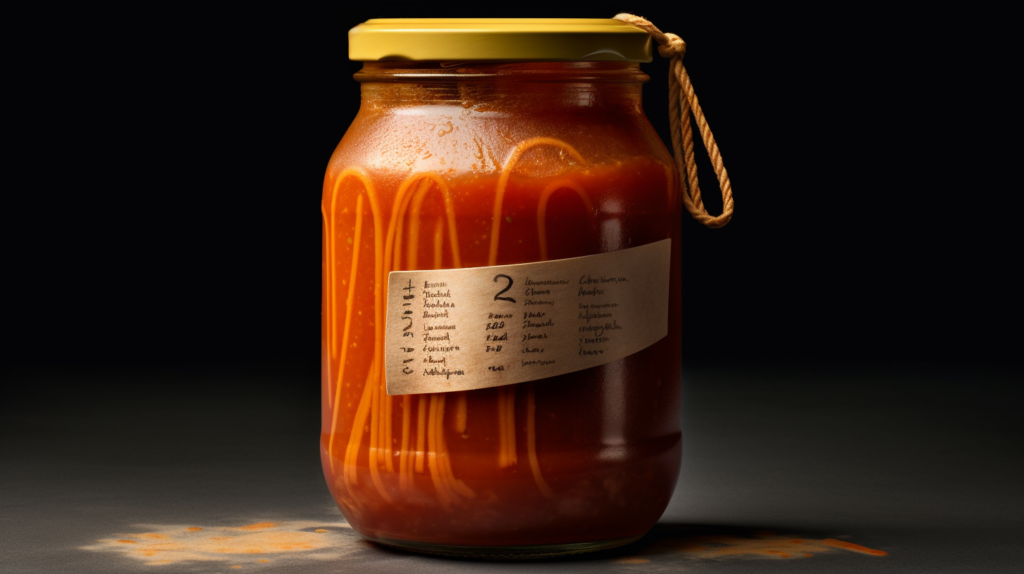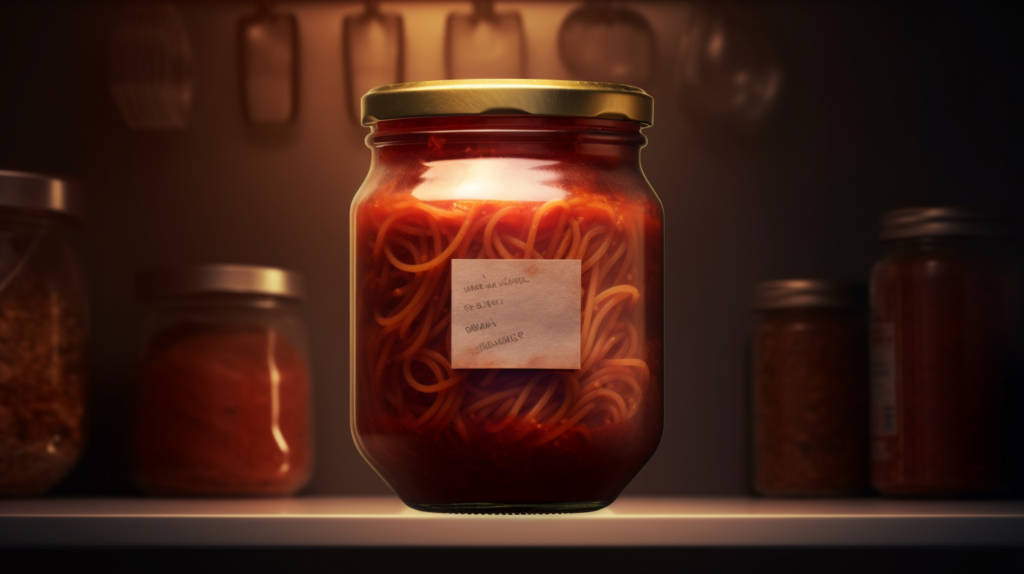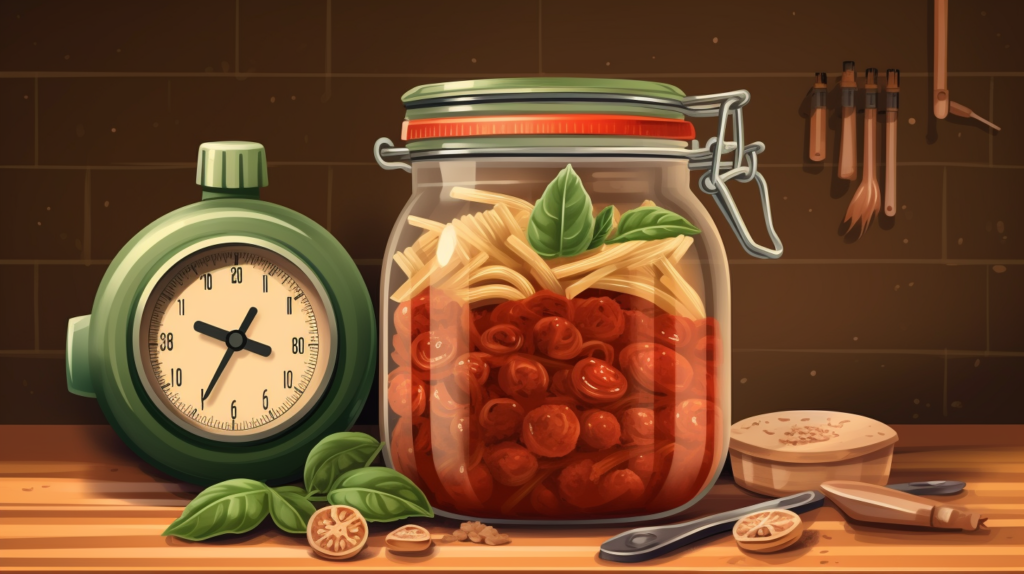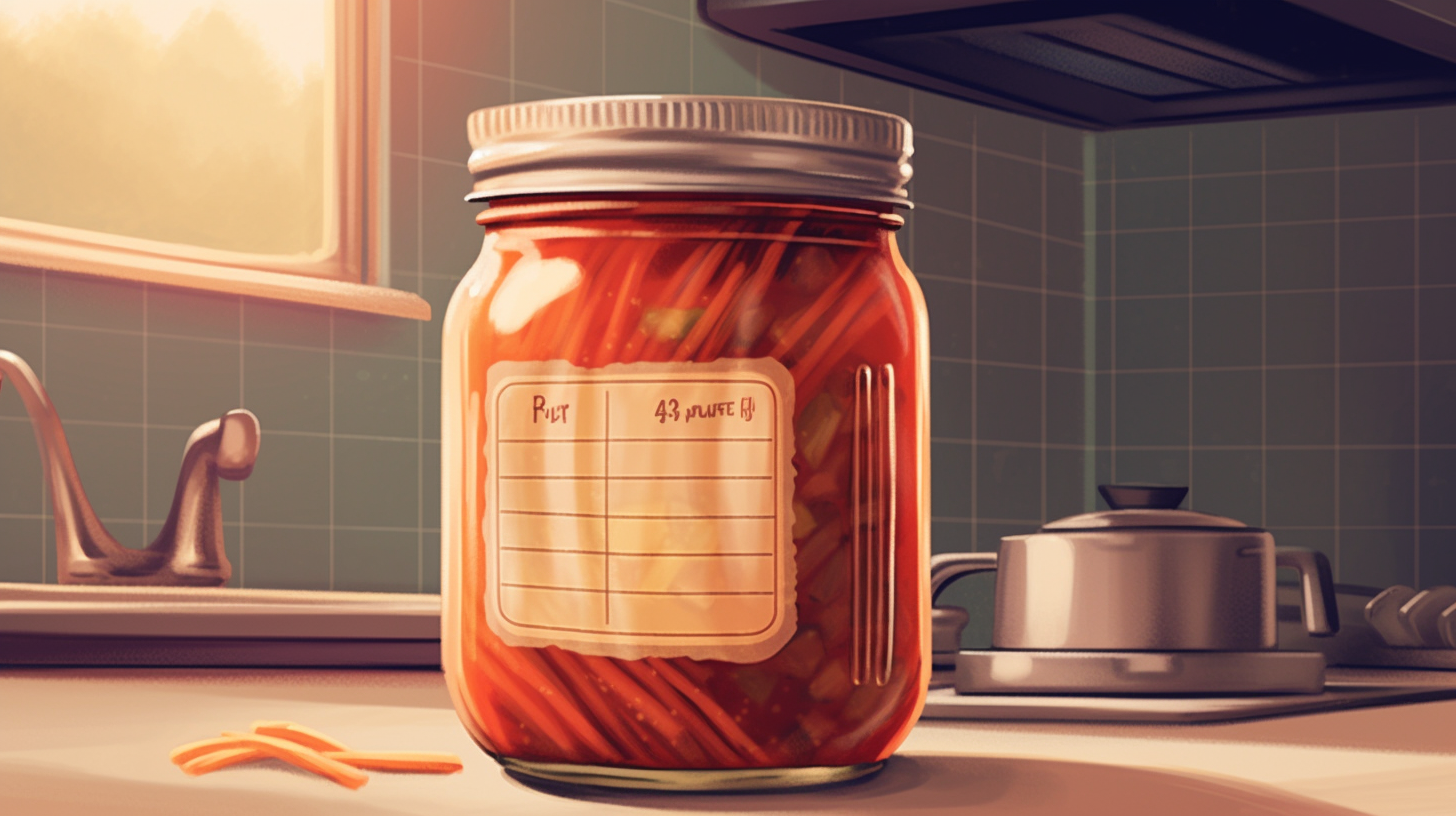Homemade spaghetti sauce with meat is a popular and delicious dish that many people enjoy making and consuming. However, like all food items, it has a limited shelf life before it starts to spoil or become unsafe to eat.
It is important to understand the factors that affect the freshness of homemade spaghetti sauce with meat and how to properly store it in order to ensure its longevity. This article aims to provide an overview of the shelf life of homemade spaghetti sauce with meat in the fridge, as well as the factors that can influence its freshness.
We will also discuss proper storage techniques for this type of sauce and highlight some common signs of spoilage to look out for. Additionally, we will offer tips on how to reheat leftover spaghetti sauce with meat and creative ways to use up any leftovers you may have.
By following these guidelines, you can enjoy your homemade spaghetti sauce with meat for as long as possible while minimizing waste and ensuring safety.
Key Takeaways
- Proper storage and refrigeration below 40°F are crucial to extend the shelf life of homemade spaghetti sauce with meat.
- Vinegar, lemon juice, salt, and sugar can increase acidity and inhibit bacterial growth in the sauce.
- Signs of spoilage include mold growth, off odors/flavors, changes in color/texture, and rancid flavor.
- Leftover spaghetti sauce can be reheated and used creatively in various dishes, and freezing can extend its shelf life for up to 6 months.
Understanding the Shelf Life of Homemade Spaghetti Sauce with Meat

The shelf life of homemade spaghetti sauce with meat can be determined by analyzing the quality and safety of the ingredients used, as well as the storage conditions in which it is kept. Preservation methods play a crucial role in maintaining its freshness and extend its shelf life.
The use of vinegar or lemon juice, for instance, can help increase acidity levels, thereby reducing microbial growth that causes spoilage. Adding salt or sugar, on the other hand, can lower water activity levels that inhibit bacterial growth.
While preservation methods are essential in extending the shelf life of homemade spaghetti sauce with meat, factors such as temperature and storage containers also affect its overall freshness. Spaghetti sauce should be stored at a temperature below 40°F to slow down microbial growth that causes spoilage. Using an airtight container can help prevent oxidation and moisture buildup that leads to spoilage. Keeping your spaghetti sauce away from direct sunlight or heat sources is also important to maintain optimum quality.
Microbial growth is another factor that affects the freshness of spaghetti sauce with meat. Bacteria thrive in warm temperatures between 40-140°F; thus, proper handling and cooking techniques are necessary to avoid contamination during food preparation. Ensuring all ingredients are thoroughly cooked before adding them into your spaghetti sauce can eliminate any bacteria present.
Factors such as preservation methods, temperature control during storage, and proper cooking techniques determine how long homemade spaghetti sauce with meat lasts in the fridge before it spoils. These factors work together to maintain optimum quality and extend its shelf life beyond what would have been possible without taking these precautions.
Factors that Affect the Freshness of Spaghetti Sauce with Meat

Factors such as storage conditions, pH level, and the presence of preservatives can impact the shelf life of spaghetti sauce with meat.
One key factor to consider is the pH level of the sauce. If it is too acidic or too alkaline, this can lead to spoilage and bacterial growth. Additionally, ingredients such as fresh herbs or garlic can also affect the pH level and thus impact the longevity of the sauce.
Another factor that impacts freshness is whether or not preservatives are used in making the spaghetti sauce with meat. Preservatives like citric acid or sodium benzoate can extend its shelf life by inhibiting microbial growth. However, some people prefer to avoid using preservatives due to potential health concerns associated with consuming them.
Freezing options and ingredient substitutions also play a role in determining how long homemade spaghetti sauce with meat will last in the fridge. Freezing can help preserve freshness for a longer period—up to three months—while ingredient substitutions like using canned tomatoes instead of fresh ones may also have an effect on how long it lasts.
Several factors influence how long homemade spaghetti sauce with meat lasts in the fridge. Storage conditions like temperature and air exposure should be considered alongside pH levels and preservative use when evaluating shelf life. Additionally, proper freezing techniques and strategic ingredient substitutions may help prolong freshness even further without compromising taste or quality.
In the next section, we’ll explore some tips for storing your homemade spaghetti sauce with meat properly to maximize its longevity.
Proper Storage Techniques for Homemade Spaghetti Sauce with Meat

Properly storing homemade spaghetti sauce with meat is essential to ensure its freshness and prevent spoilage. Here are some tips for preserving the flavor of your homemade sauce:
- Store in an airtight container: One of the most important things you can do when storing spaghetti sauce is to keep it in an airtight container. This will help prevent air from getting in and causing spoilage.
- Refrigerate promptly: It’s important to refrigerate your spaghetti sauce as soon as possible after cooking it. Leaving it out at room temperature for too long can allow bacteria to grow, which can cause foodborne illnesses.
- Freeze for longer storage: If you’re not planning on using your homemade spaghetti sauce within a few days, consider freezing it for longer-term storage. Frozen spaghetti sauce can last up to six months when properly stored.
- Label and date containers: Whether you’re storing your spaghetti sauce in the fridge or freezer, be sure to label each container with its contents and date so that you know how long it’s been stored.
- Use proper thawing techniques: When thawing frozen spaghetti sauce, always do so in the refrigerator rather than at room temperature. This will help prevent bacterial growth and maintain the quality of the sauce.
By following these tips, you’ll be able to enjoy your homemade spaghetti sauce with meat for longer periods without worrying about spoilage or loss of flavor.
However, if you notice any signs of spoilage such as mold growth or off odors/flavors, discard the sauce immediately to avoid any potential health hazards.
Signs of Spoilage to Look Out For
Detecting signs of spoilage in homemade spaghetti sauce with meat is crucial to avoid potential health hazards. Spoiled food can cause foodborne illnesses, which can lead to severe health complications. Common causes of spoilage in homemade spaghetti sauce with meat include improper storage techniques, high temperatures, and contamination during preparation.
Prevention of spoilage in homemade spaghetti sauce with meat involves proper storage techniques such as refrigerating the sauce within two hours after cooking it. The sauce should be stored in an airtight container and placed at a temperature below 40°F (4°C). Additionally, reheating the sauce thoroughly before consuming it can help kill any bacteria that may have grown while stored.
Identifying rancid flavor is one of the most common signs of spoilage in homemade spaghetti sauce with meat. Rancidity occurs when fats or oils break down into harmful byproducts, resulting in an unpleasant taste and odor. If you notice any changes in color or texture or a sour smell emanating from your spaghetti sauce with meat, it’s best not to consume it.
Preventing spoilage in homemade spaghetti sauce with meat requires proper storage techniques such as refrigeration and thorough reheating before consumption. Identifying rancid flavor is essential to avoid consuming spoiled food that can cause foodborne illnesses. In the next section, we will discuss tips for reheating leftover spaghetti sauce with meat without compromising its quality and safety.
Tips for Reheating Leftover Spaghetti Sauce with Meat
When reheating leftover spaghetti sauce with meat, there are several effective techniques that can help maintain its quality and safety. The most common method is to reheat it on the stovetop over medium heat until it reaches an internal temperature of 165°F. This ensures that any bacteria that may have grown while in the refrigerator or freezer are killed off. Another technique is to use a microwave oven, which is faster but can result in uneven heating and loss of flavor.
To enhance the flavor of leftover spaghetti sauce with meat, you can add a few ingredients such as fresh herbs, garlic powder, onion powder, or red pepper flakes. These additives will not only improve the taste but also give your dish a unique twist. In addition, you can also add some cream or cheese to make the sauce richer and creamier.
If you want to enjoy your leftover spaghetti sauce with meat in a different way than just reheating it as a pasta dish there are many creative ways to use up this versatile ingredient. For example, you could use it as a topping for baked potatoes or as a filling for omelets or quesadillas. You could also mix it with rice or quinoa for an easy one-pot meal idea.
The possibilities are endless when using leftover spaghetti sauce with meat!
Creative Ways to Use Up Leftover Spaghetti Sauce with Meat
There are numerous ways to repurpose leftover spaghetti sauce with meat, allowing for a variety of delicious and creative meal options. Whether you have a small amount of leftover sauce or a large batch, there are plenty of recipes that can be made with the addition of just a few ingredients.
One option is to use your leftover sauce as a base for homemade pizza. Simply spread the sauce onto your favorite crust, add toppings such as cheese, vegetables, and additional meats if desired. Bake in the oven until the crust is crispy and golden brown. This provides an easy and quick dinner option without having to prepare an entirely new meal from scratch.
Another way to utilize any remaining spaghetti sauce is to incorporate it into soup or chili recipes. Adding it to vegetable broth along with some canned beans and corn creates a hearty and filling chili recipe that can be enjoyed throughout the week. Or try adding some extra veggies like carrots or zucchini for added nutrition.
Meal planning is another great way to ensure that your leftover spaghetti sauce doesn’t go unused. Consider using it as part of your weekly meal plan by incorporating it into dishes like lasagna or stuffed shells. These meals can easily be frozen and reheated later on when you need a quick dinner option.
Consider using any remaining spaghetti sauce as a marinade for meats such as chicken or beef before grilling them on the barbecue. This adds flavor while also helping keep the meat moist during cooking.
In conclusion, there are many creative ways to use up leftover spaghetti sauce with meat beyond simply reheating it over noodles again. Incorporating it into pizza, soups/chilis, meal planning dishes like lasagna/stuffed shells or using it as marinade will allow you to create new meals full of flavor without needing many additional ingredients. By considering these options when making your next batch of spaghetti sauce, you’ll never have wasted leftovers again!
Frequently Asked Questions
Can homemade spaghetti sauce with meat be stored in the freezer?
Homemade spaghetti sauce with meat can be stored in the freezer as one of the freezing alternatives. The meat storage guidelines suggest that cooked meat dishes can be kept in the freezer for up to four months.
However, it is important to properly store the sauce by placing it in an airtight container or plastic bag and labeling it with the date of preparation. This will help ensure that the sauce maintains its quality and taste when thawed for future use.
Additionally, it is recommended to portion out the sauce before freezing so that only what is needed can be thawed at once, reducing waste and potential spoilage.
Overall, homemade spaghetti sauce with meat can be safely stored in the freezer using proper storage techniques and adhering to recommended meat storage guidelines.
How long will homemade spaghetti sauce with meat last if stored in the freezer?
Freezer storage is an excellent method to prolong the shelf life of homemade spaghetti sauce with meat. When properly stored in an airtight container, it can last for around three months without losing its quality and taste.
To thaw the sauce, place it in the refrigerator for several hours or overnight. Alternatively, use a microwave on a defrost setting or immerse the container in cold water until completely thawed. It’s essential to reheat thoroughly before serving to ensure that all bacteria are eliminated.
Additionally, leftover spaghetti sauce with meat can be used creatively for meal prep ideas such as using it as a base for lasagna or baked ziti. Another option is adding it to soups and stews for added flavor and protein.
With these tips, enjoying delicious meals made from homemade spaghetti sauce with meat is convenient and easy!
What ingredients can be added to homemade spaghetti sauce with meat to extend its shelf life?
Preservatives in homemade spaghetti sauce can be added to extend its shelf life.
There are several tips for storing homemade spaghetti sauce with meat that can also help prolong its freshness.
One option is to add acidic ingredients such as vinegar or lemon juice, which can inhibit the growth of bacteria.
Another option is to use salt or sugar as a natural preservative.
Additionally, the use of proper storage containers and refrigeration at appropriate temperatures can also help prevent spoilage and increase the lifespan of homemade spaghetti sauce with meat.
It is important to note that while these methods may extend the shelf life of the sauce, it is still recommended to consume it within a certain timeframe and always prioritize food safety practices.
Can homemade spaghetti sauce with meat be canned for long-term storage?
Canning homemade spaghetti sauce with meat is an option for long-term storage, but care must be taken to ensure safety.
It is important to note that acidity levels play a crucial role in determining whether or not a food can be safely canned.
In order to can spaghetti sauce with meat, it must have a pH of 4.6 or lower to inhibit the growth of harmful bacteria such as Clostridium botulinum.
This means that adding low-acid ingredients such as vegetables or dairy products may make the sauce unsafe for canning unless additional measures are taken to increase its acidity level.
Therefore, if you want to can homemade spaghetti sauce with meat, it is essential to follow established guidelines and procedures for canning safety.
How often should homemade spaghetti sauce with meat be stirred while reheating?
When reheating homemade spaghetti sauce with meat, it is important to stir it at regular intervals for even distribution of heat. Stirring the sauce will help prevent hot spots and ensure that all parts are heated thoroughly. The benefits of stirring include a smoother texture and better flavor as the ingredients blend together more effectively.
Best practices for reheating also include heating the sauce in a covered container on low heat to avoid burning or drying out. It is recommended to check the temperature regularly using a food thermometer to ensure that it reaches 165°F before serving.
By following these best practices, you can safely and effectively reheat homemade spaghetti sauce with meat for optimal taste and quality without worrying about how long it lasts in the fridge.
Conclusion
In conclusion, homemade spaghetti sauce with meat can last up to 4-5 days in the fridge if stored properly. However, factors such as temperature and hygiene practices during preparation can affect its shelf life. It is essential to use airtight containers and refrigerate the sauce immediately after cooking to prevent bacterial growth.
If you notice any signs of spoilage such as mold or an off odor, it is best to discard the sauce. Reheating leftover spaghetti sauce with meat should be done gradually over low heat to avoid burning or drying out the meat.
Lastly, leftover spaghetti sauce with meat can be used creatively in recipes such as lasagna or added to soups for extra flavor.
While it may seem like a trivial matter, proper storage and handling of food is crucial for ensuring its safety and freshness. So go ahead and enjoy your homemade spaghetti sauce with meat, just make sure to store it correctly!

